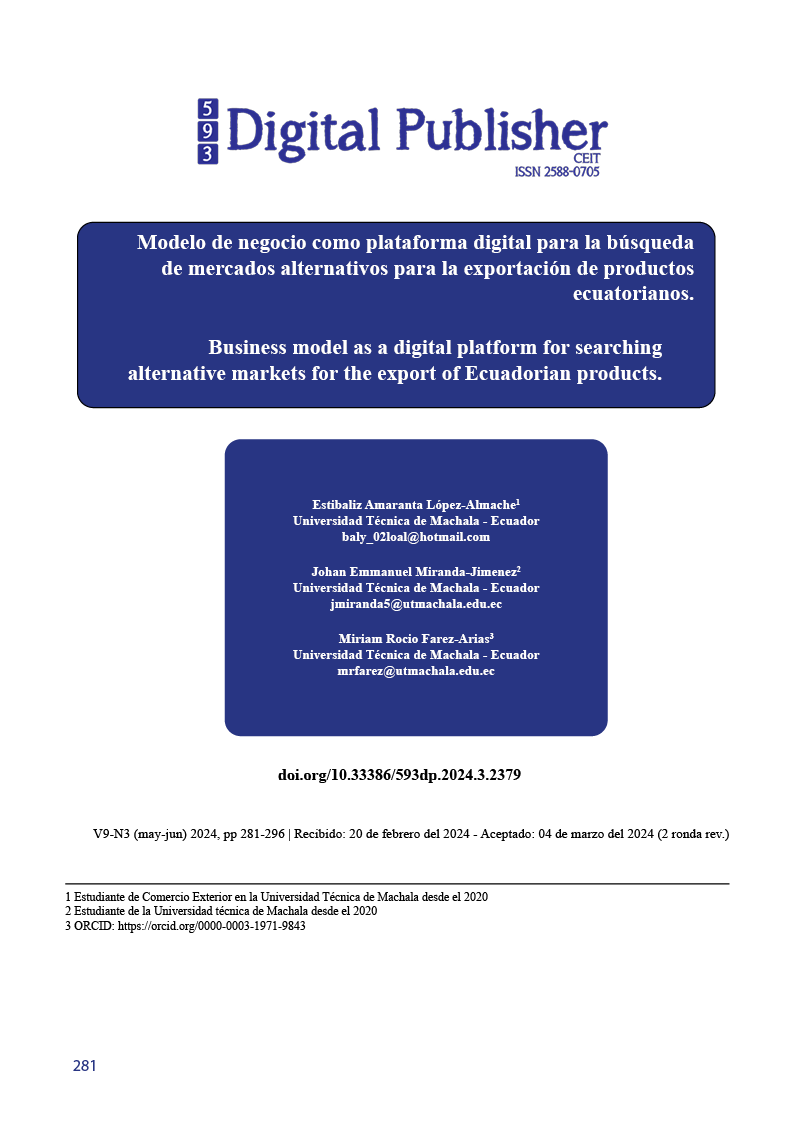Modelo de negocio como plataforma digital para la búsqueda de mercados alternativos para la exportación de productos ecuatorianos.
Contenido principal del artículo
Resumen
El tema de investigación sobre el modelo de negocio digital para las exportaciones de productos tradicionales ecuatorianos fue de gran relevancia en un mundo cada vez más digitalizado. La importancia radicó en la necesidad de aprovechar las tecnologías digitales, como la inteligencia artificial y el machine learning, para mejorar la competitividad de los productos tradicionales en los mercados internacionales y garantizar un crecimiento económico sostenible para Ecuador. El presente trabajo se desarrolló con el objetivo principal de elaborar un modelo de negocio como plataforma digital, mediante el uso de inteligencia artificial, con el propósito de potenciar la búsqueda de mercados alternativos y facilitar la exportación de productos tradicionales ecuatorianos. Se han empleado métodos teóricos y empíricos, incluyendo el método histórico-lógico para descomponer el problema y el método analítico-sintético para comprender mejor los elementos del proceso de búsqueda de mercados alternativos. El método inductivo-deductivo se ha utilizado para analizar las interacciones en el sistema de exportación. En cuanto a los métodos empíricos, se utilizó información cuantitativa obtenida mediante entrevistas en profundidad, análisis de contenido y observación participante con empresas exportadoras y actores relevantes. Los resultados presentados por el modelo de negocio, elaborado mediante un software, indicaron los mercados alternativos a los cuales los usuarios podrían acceder en caso de que su mercado principal fallara, agilizando así el proceso de exportación. Se concluyó que el desarrollo de este modelo potencia la búsqueda de mercados alternativos facilitando así la exportación de productos tradicionales ecuatorianos.
Descargas
Detalles del artículo

Esta obra está bajo una licencia internacional Creative Commons Atribución-NoComercial-CompartirIgual 4.0.
1. Derechos de autor
Las obras que se publican en 593 Digital Publisher CEIT están sujetas a los siguientes términos:
1.1. 593 Digital Publisher CEIT, conserva los derechos patrimoniales (copyright) de las obras publicadas, favorece y permite la reutilización de las mismas bajo la licencia Licencia Creative Commons 4.0 de Reconocimiento-NoComercial-CompartirIgual 4.0, por lo cual se pueden copiar, usar, difundir, transmitir y exponer públicamente, siempre que:
1.1.a. Se cite la autoría y fuente original de su publicación (revista, editorial, URL).
1.1.b. No se usen para fines comerciales u onerosos.
1.1.c. Se mencione la existencia y especificaciones de esta licencia de uso.
Citas
Acurio Armas, J. A., Bustillos Mena, S. F., Triviño Vera, K., & Cartagena Herrera, M. E. (2018, 11 2). Modelo de comercialización de productos generadores del valor agregado en base al banano. Dilemas Contemporáneos: Educación, Política y Valores, p1-16. https://search.ebscohost.com/login.aspx?direct=true&AuthType=sso&db=eu e&AN=132932890&lang=es&site=eds-live&custid=s1490369
Arango Palacio, I. C. (2021, 1 1). Opportunities for the digital transformation of the banana sector based on artificial intelligence software. Revista Politécnica, 17(33), p47-63. 10.33571/rpolitec.v17n33a4 24
Barbosa Mariño, J. D., Dangón Novoa, S. L., & Monroy Ramírez, N. (2021, 6 1). Algunas consideraciones aduaneras y de comercio internacional en la economía digital . Revista del ICDT, 57(84), p389-432. https://search.ebscohost.com/login.aspx?direct=true&AuthType=sso&db=lgs &AN=156063597&lang=es&site=eds-live&custid=s1490369
Barrera Arrestegui, L., (2012). Fundamentos históricos y filosóficos de la inteligencia artificial. UCV-HACER. Revista de Investigación y Cultura, 1(1), 87-92. https://www.redalyc.org/pdf/5217/521752338014.pdf?utm_source=pocket_save s
Caicedo Consuegra, L. D., Márquez Vásquez, P. A., & Meza Pérez, A. M. (2023, 7 1). Artificial intelligence algorithms based on socio-behavioral profiles for intelligent customer segmentation: Case study. Ingeniería y Competitividad, 25(3), 1-17. Fuente Académica Premier. 10.25100/iyc.v25i3.12658
Caidedo Langthon, A., & Mayorga Valderrama, D. (2021, 6 1). Technological development and innovation in customs and foreign trade operations: trends and suggestions for the Colombian case. Revista del ICDT, 57(84), p449-472. Legal Source. 01220799
Cintia, P. (2017, 6 1). La inteligencia artificial ya impacta en los negocios. Revista IDEA, 40(266), 48-52. Business Source Complete. Retrieved 9 6, 2023, from https://web.p.ebscohost.com/ehost/detail/detail?vid=55&sid=6aa0407c208b-4930-9195- 747c23a1a754%40redis&bdata=JkF1dGhUeXBlPXNzbyZsYW5nPWVzJn NpdGU9ZWhvc3QtbGl2ZQ%3d%3d#AN=127364105&db=bth
Cueva, N. (2022, 11 14). Companies and organizations need to reinvent themselves to respond to the challenges of an environment marked by the digital economy. ComHumanitas: Revista Científica de Comunicación, 13(2), 62-68. Academic Search Complete. 10.31207/rch.v13i2.353
Cungarache, Y. M. (2021). Herramientas de inteligencia comercial para la selección de mercados que utilizan los exportadores del sector agrícola. https://repositorio.upn.edu.pe/bitstream/handle/11537/28421/Cungarache%20Cr uz%20Yeny%20Mirian.pdf?isAllowed=y&sequence=1&utm_source=pocket_sa ves
Especial Directivos. (2021, 9 1). Cinco ventajas de aplicar la inteligencia artificial en el comercio electrónico. Especial Directivos, (1805), 79-81. Fuente Académica Premier. Retrieved 9 6, 2023, from https://web.p.ebscohost.com/ehost/detail/detail?vid=70&sid=6aa0407c208b-4930-9195- 747c23a1a754%40redis&bdata=JkF1dGhUeXBlPXNzbyZsYW5nPWVzJn NpdGU9ZWhvc3QtbGl2ZQ%3d%3d#AN=152212918&db=fua
Gandia, R., & Parmentier, G. (2020, 11 1). La gestion stratégique d'un portefeuille de business models connectés : une application aux secteurs du numérique. Management international / International Management / Gestiòn Internacional, 24(5), p186-204. 10.7202/1075489ar
Sandoval, L. J. (2018). Algoritmos de aprendizaje automático para análisis y predicción de datos. REVISTA TECNOLÓGICA N° 11. http://redicces.org.sv/jspui/handle/10972/3626
Succeeding in the AI supply-chain revolution. (2021, April 30). McKinsey & Company; McKinsey & Company. https://www.mckinsey.com/industries/metals-and-mining/our-insights/succeeding-in-the-ai-supply-chain-revolution
Tang Tong, M. M., (2015). La inteligencia de mercado en las empresas exportadoras e importadoras peruanas. Ingeniería Industrial, (33), 71-97. https://www.redalyc.org/pdf/3374/337443854004.pdf?utm_source=pocket_save s
Tapia Sánchez, L. S. (2022, 6 1). Technology and Law: a Look at e-Commerce, Cybercrime and Soft Law. AIS: Ars Iuris Salmanticensis, 10(1), p199-226. Legal Source. 10.14201/AIS2022101199226
Torres Rivera, A. D. (2020, 11 1). Aplicaciones de la Inteligencia Artificial en los Modelos de Negocios Digitales. Recherches en Sciences de Gestion, (141), 67-88. Business Source Complete. Retrieved 9 6, 2023, from https://web.p.ebscohost.com/ehost/detail/detail?vid=46&sid=6aa0407c208b-4930-9195- 747c23a1a754%40redis&bdata=JkF1dGhUeXBlPXNzbyZsYW5nPWVzJn NpdGU9ZWhvc3QtbGl2ZQ%3d%3d#AN=151374459&db=bth
Toyama Miyagusuku, J., & Rodríguez León, A. (2019, 7 1). Algoritmos laborales: Big Data e inteligencia artificial. Themis: Revista de Derecho, 75, p255-266. 10.18800/themis.201901.018
Uriguen Aguirre, P. A., & Ramírez Porras, J. T. (2023, 1 1). Aspectos socioeconómicos y su determinación producto de la actividad camaronera en la parroquia Puerto Jelí del cantón Santa Rosa. Dilemas Contemporáneos: Educación, Política y Valores, 10(2), p1-33. https://search.ebscohost.com/login.aspx?direct=true&AuthType=sso&db=eu e&AN=163157905&lang=es&site=eds-live&custid=s1490369
Vargas, C. (2012). Alan Turing: Máquinas e inteligencia. en conmemoración de los 100 años de su nacimiento. Revista Aporía, 4, 43-63. https://d1wqtxts1xzle7.cloudfront.net/64688382/ALAN_TURING_MAQUI NAS_E_INTELIGENCIA-libre.pdf?1602774211=&response-contentdisposition=inline%3B+filename%3DALAN_TURING_MAQUINAS_E_I NTELIGENCIA_EN_C.pdf
Vega, M. (2009). Instrumentos mercadológicos para la promoción del comercio internacional. 21 https://repositorio.ulacit.ac.cr/bitstream/handle/123456789/9038/038235.pdf?seq uence=1&utm_source=pocket_saves Vidal, M. J., González, A. M., & Valdés, D. (2019). Inteligencia artificial en la docencia médica. SciELO, 33. http://scielo.sld.cu/scielo.php?pid=S0864- 21412019000300014&script=sci_arttext&utm_source=pocket_saves
Vergara, S. (2021, 4 1). El papel de las capacidades productivas y tecnológicas en la dinámica de las exportaciones de los países en desarrollo. Revista de la CEPAL, (133), p7-32. 10.18356/16820908-2021-133-1




